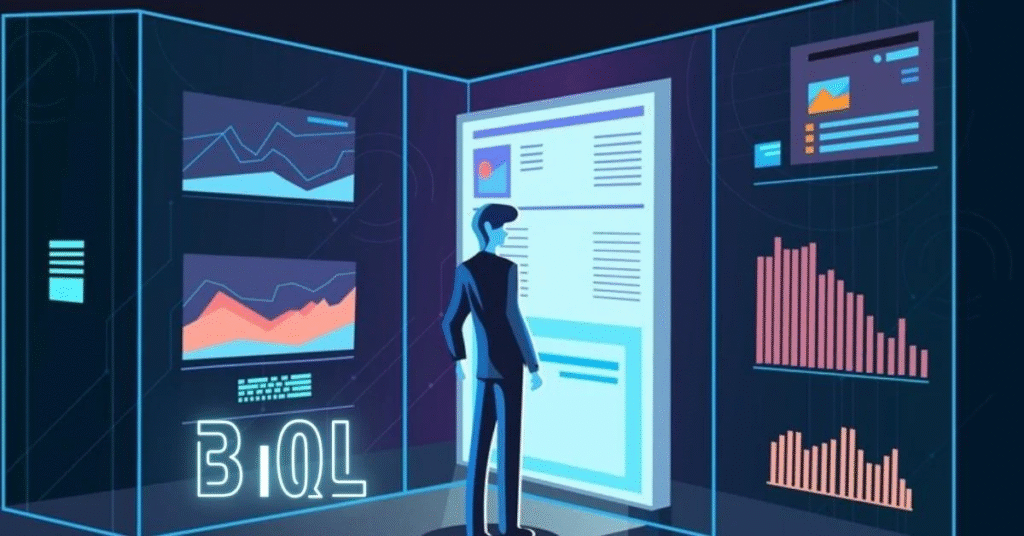Have you ever wished data could talk back to you? Imagine asking your computer or device a question in plain language like “What are our sales this month?” or “Which product is performing best?” and getting an instant answer. That’s exactly what bıql does.
This guide will help you understand bıql from top to bottom — what it is, how it works, and why it could change how people work with data forever. Whether you’re in business, education, farming, or even transportation, bıql can help you make smarter choices.
What is Bıql? A Simple Explanation
Bıql is a smart tool that lets people ask questions about their data using everyday language. You don’t need to be a data expert or know how to write code. Just ask a question the way you normally would, and bıql finds the answer for you.

Think of bıql as your personal data assistant. It understands human language, looks through your data, and gives you clear answers — often with helpful charts or summaries.
How Bıql Works (Without The Technical Jargon)
Behind the scenes, bıql uses something called Natural Language Processing (NLP) and machine learning. That might sound complicated, but here’s what it means in simple terms:
Also Read:Kennedy Funding Ripoff Report: A Deep Dive into Allegations and Reality
You type or speak your question. Bıql understands what you’re asking, just like a person would. It searches through your data to find the answer. Then it shows you the result in an easy-to-read way. The beauty of bıql is that it doesn’t require coding, training, or a degree in computer science. It’s made for everyone — from small business owners to students to government agencies.
Where Did Bıql Come From?
Bıql was built by tech developers who saw a problem: too many people couldn’t understand or use their own data. They created bıql to solve this issue, making it easier and faster to get answers without digging through spreadsheets or learning special software.
Since then, bıql has grown. It’s now used in many industries and countries around the world. Companies, schools, and even farmers are using it to make better choices every day.
Why Bıql is a Game-Changer for Everyone
Bıql isn’t just another tech tool. It’s a way of working smarter. Here are a few reasons why people love using bıql:
It saves time. No more hunting for reports or waiting on the IT team. It’s easy to use. If you can ask a question, you can use bıql. It helps people make better decisions. It works with your existing tools and data. It grows with your needs. For example, imagine a teacher asking, “Which students improved their math scores this term?” or a store manager wondering, “What was our most popular product last week?” Bıql gives answers fast — and in a way anyone can understand.
How Bıql Is Used in Real Life
Let’s look at some real-world ways people are using bıql to improve their work and daily lives.
Also Read:Unsent Project: A Global Window Into Unspoken Love
Bıql in Business
Business leaders use bıql to track sales, understand customers, and manage teams. For example:
A restaurant owner might ask, “Which dishes are selling the most this week?” A store manager might ask, “How are our online sales doing compared to last month?” Instead of waiting for reports or hiring data analysts, they get answers in seconds. That means faster decisions and more profit.
Bıql in Healthcare
Doctors and hospitals are using bıql to manage patient care and records more efficiently. They can ask questions like:
“How many patients visited last month with flu symptoms?” “Which medicine is prescribed the most?” This helps doctors save time and focus more on their patients.
Bıql in Farming and Agriculture
Farmers now use bıql to track crops, weather, and animal health. For instance:
“What field had the highest crop yield last season?” “Did fertilizer improve growth in June?” With this information, they can make better decisions about planting, watering, and harvesting.
Bıql in Transportation
In cities, traffic planners use bıql to improve travel and safety. They ask questions like:

“When is traffic heaviest near the school zone?” “What bus routes have the most delays?” Answers help make roads safer and transportation smoother.
Bıql in Education
Teachers and school leaders use bıql to understand student performance and class data. A teacher might ask:
Also Read:Drive Social Media Lawsuit: What Happened and Why It Matters
“How many students missed more than five classes?” “Which students improved the most this semester?” This helps teachers support students better and improve results.
Top Features That Make Bıql Powerful
1. Understands Natural Language
Bıql can understand everyday language. You don’t need to use exact keywords or commands. Just ask your question normally.
2. Instant Results
You get answers fast — often in seconds. That saves hours or even days.
3. Easy Charts and Visuals
Bıql doesn’t just give text answers. It also shows graphs, tables, and charts to help you see trends quickly.
4. Safe and Secure
Your data stays safe. Bıql uses modern security tools to protect your information.
5. Works with What You Already Have
You don’t need to change your software. Bıql connects with tools like Excel, Google Sheets, and cloud storage.
What Makes Bıql Different from Other Tools
There are many data tools out there — so why choose bıql?
It’s human-friendly. No coding, no tech talk. It’s fast and reliable. It works in many languages and across devices. It fits many industries — not just tech. It grows with your needs, whether you’re a small business or a big company.
How to Get Started with Bıql
Getting started with bıql is easy. Here’s how:
Go to the bıql website or partner platform. Create an account (it’s usually quick and simple). Connect your data (like files or spreadsheets). Ask a question in your language. See the answer — and explore more! Some platforms offer free trials or demos so you can try bıql before paying.

Tips to Make the Most of Bıql
Be clear with your questions. Simple language works best. Try different question styles to learn what works. Use filters and follow-up questions for deeper insights. Train your team to ask useful questions. Keep your data clean and up-to-date for best results.
Also Read:127.0.0.1:62893 — A Complete and Easy Guide
The Future of Bıql
Bıql is still growing. In the near future, we may see even more features like:
Voice questions instead of typing. Real-time alerts based on live data. More advanced prediction tools. Personalized dashboards for each user. Bıql is on the path to becoming a standard tool in many workplaces, classrooms, and even homes.
Frequently Asked Questions About Bıql
What does Bıql mean?
Bıql is a smart data assistant that understands natural language and gives quick answers from your data.
Do I need to know programming to use Bıql?
No! You just ask questions in plain language — no coding skills are needed.
Can I use Bıql with Excel or Google Sheets?
Yes, Bıql connects with common tools like Excel, Sheets, and many others.
Is Bıql safe to use?
Yes, Bıql uses strong data protection and privacy methods to keep your information safe.
Can Bıql be used in schools and farms?
Absolutely. Bıql is flexible and works in many fields — from education to agriculture to healthcare.
Is Bıql available in my country?
Since Bıql works online, it’s available to people around the world. Check the official site for supported languages and features.
Final Thoughts on Bıql
Bıql is more than just a tool. It’s a new way to connect with data. You don’t need to be a tech genius — just ask what you want to know, and bıql tells you.
From businesses to classrooms, from farms to hospitals, bıql helps people everywhere make faster, better decisions. It saves time, improves accuracy, and brings power back to the users.
If you’re looking for a smart, simple way to use your data, give bıql a try. It might just change how you work — forever.
